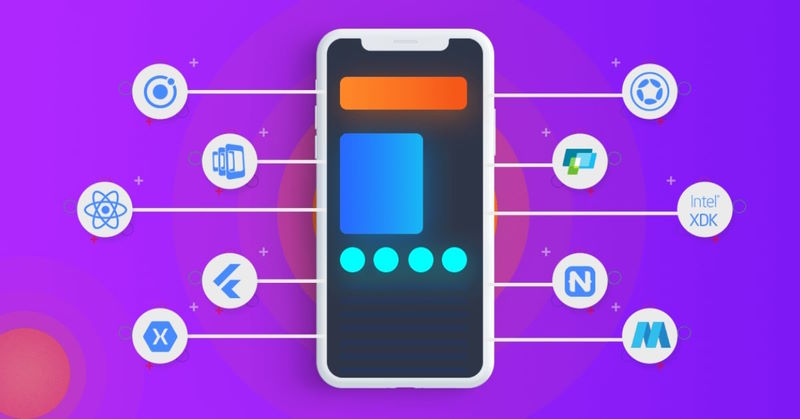Android or iOS these two platform strikes your mind whenever you think of developing an app. Here, many startups fall short as they focus only on a single platform application to reach their audience digitally. Lack of budget, resources, time, and even less exposure, the reason could be anything.
We know that choosing an app development approach is challenging as it involves a lot of time, effort, and funds. However, if you choose only Android, there are high odds you are missing a sheer number of your target audience using iOS and vice versa.
Here, the best yet wise choice is hybrid app development. These apps are cross-platform compatible, meaning they run seamlessly in multiple operating systems. This helps you reach the maximum number of people using iOS, Android, Windows, and Web Apps.
Whether you choose to hire a developer or hybrid app development services provider, several benefits can be unlocked through this approach. Let us navigate you to each!
Biggest advantages of a hybrid app development approach to businesses

As a hybrid app is capable of running seamlessly across various operating systems, with a single app you can touch a huge number of people who are present on multiple platforms.
One of the major conveniences that a hybrid app development approach gives is that once you write the code, it can be run anywhere. This ease and accessibility help in accelerating the mobile app development process. Not only this, there are more benefits that this app development offers including:
1. Cost-effective approach
Many businesses, especially startups develop an app for a single platform due to budget constraints. They often forget that with time their company will scale which would change their requirements. They would need an app to run on different operating systems.
As a result, they end up spending more money, resources, and time on this facet. Because they hire developers again to get the coding done and explore new libraries, APIs (Application Programming Interface), etc.
Rather than creating various versions of apps for different platforms, develop a hybrid app that works across all platforms. This approach is a budget saver for small-scale businesses.
2. Ease of integration
The hybrid app uses the device programming language to harmonize with other compatible applications. This feature saves developers from the fuss of integration because this approach helps in the seamless assimilation of cameras, messages, GPS, and other data in the app to offer a better user experience.
The hybrid approach lets developers use the same library instead of juggling between different APIs, SDKs, etc. Furthermore, apps made for a single platform cannot be installed in another, making it impossible to integrate with other apps. Hybrid apps can be utilized in any atmosphere without any limitations.
3. Wider reach
A hybrid app is an effective tool for businesses to reach a wide audience on multiple devices and platforms. With a single source, you can grow your brand to the next level. The ease of reusing the code for all operating systems and platforms makes it a gainful option for businesses.
There are billions of smartphone users in the world with varied operating systems. As hybrid apps run uninterruptedly across all devices, you can reach countless users at once. This makes the hybrid approach a profitable option for businesses in this highly evolving and competitive market.
4. Ease of maintenance
Developing different versions of apps for diverse platforms makes it tough to ensure the quality and functionality of each. The process of testing the apps for QA requires a lot of time, expense, and resources. Managing a single app is already challenging, so handling multiple apps can get way tougher.
If you choose the hybrid app development approach, you will follow a single codebase. Maintaining the quality of a single hybrid app across all platforms is way simpler than a single-platform approach. Additionally, updating and adding new versions of a hybrid app is comparatively swifter than a single-platform app. Updating a hybrid app is as simple as reloading a web page.
5. Rapid development
Developing an app for diverse platforms requires a lot of time. From hiring developers, and research to planning and executing features on each is a lengthy process. With hybrid app development, all the planning, researching, and execution will be done for a single codebase.
The hybrid app development process is reasonably shorter than native app development. Many hybrid app development frameworks help in accelerating the whole process. You can pick one that suits your needs.
6. Better performance and speed
One of the key reasons behind an app’s slow performance is the extensive and lengthy coding. As hybrid app frameworks work on less coding and use the same code repeatedly, it offers better speed and performance. Twitter is one of the popular examples of hybrid apps.
The dependency on network connectivity of hybrid apps is none. This makes them run at high speed even in heavy traffic. So, if you want your business app to work flawlessly without lags, the hybrid approach is the right choice.
7. Better UX/UI
Hybrid app development gives you access to innumerable resources to boost the user interface. The more improved the user interface, the better will be the user experience. As hybrid apps work faster and better across all platforms, it enhances user experience.
Hybrid apps are lightweight, load rapidly, and display content in front of users quickly. All these aspects play a major role in improving the user interface and augmenting user experience.
Summing Up
Hybrid app development is becoming dominant each day. Implementing app development trends and accessing the newest versions makes the maintenance of hybrid apps super easy.
Cross-platform compatibility and ease of maintenance are one of the major reasons why many businesses and developers are choosing a hybrid development approach.
You are now aware of the multitude of benefits that come from hybrid app development. Hybrid apps are undeniably a great path that works for your business flourishment.
Hope you found this post helpful in making the right decision!








